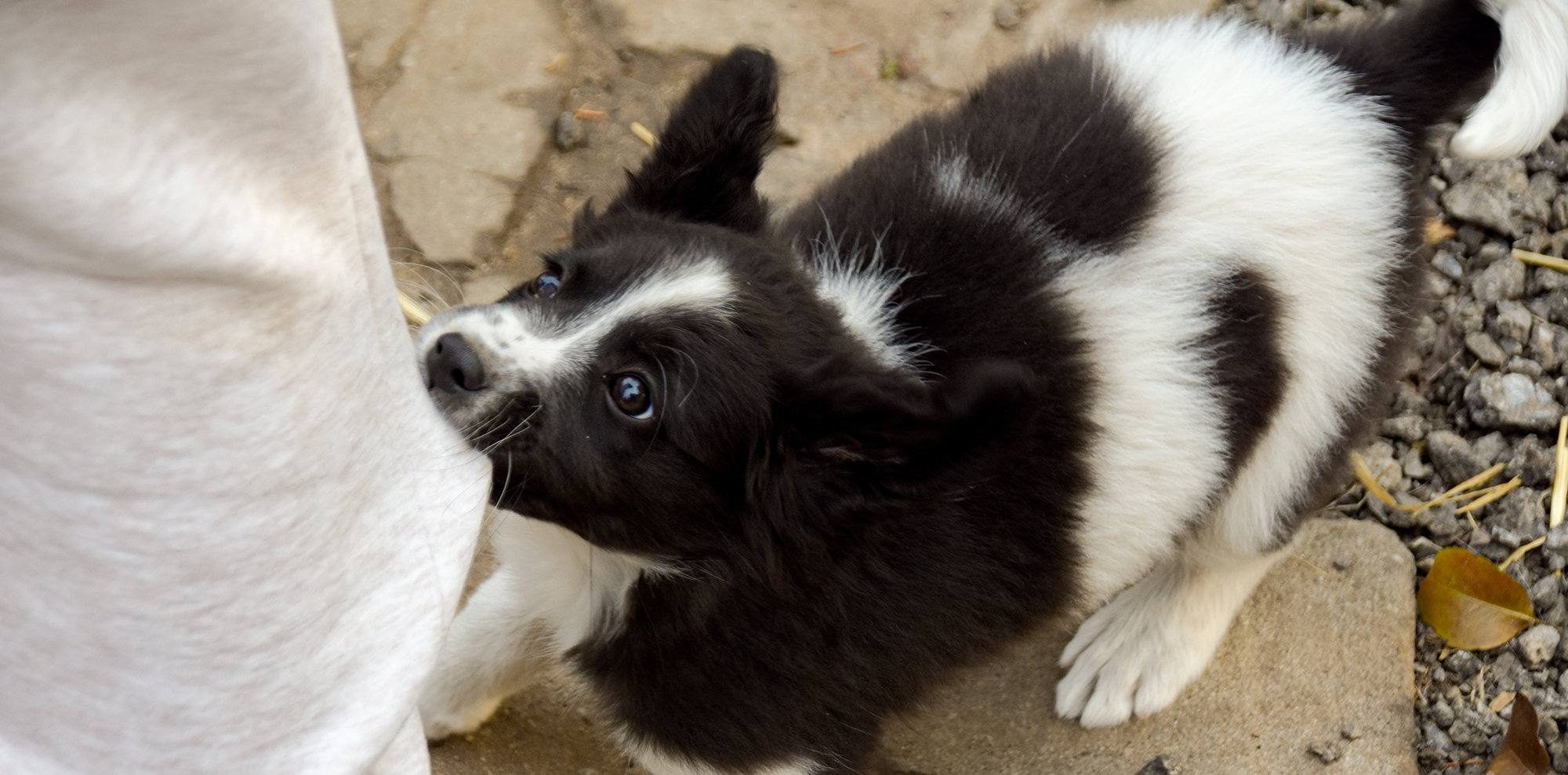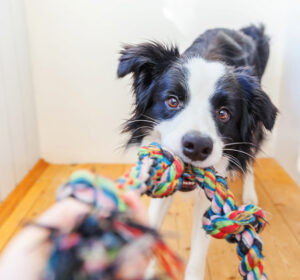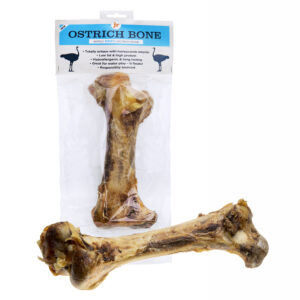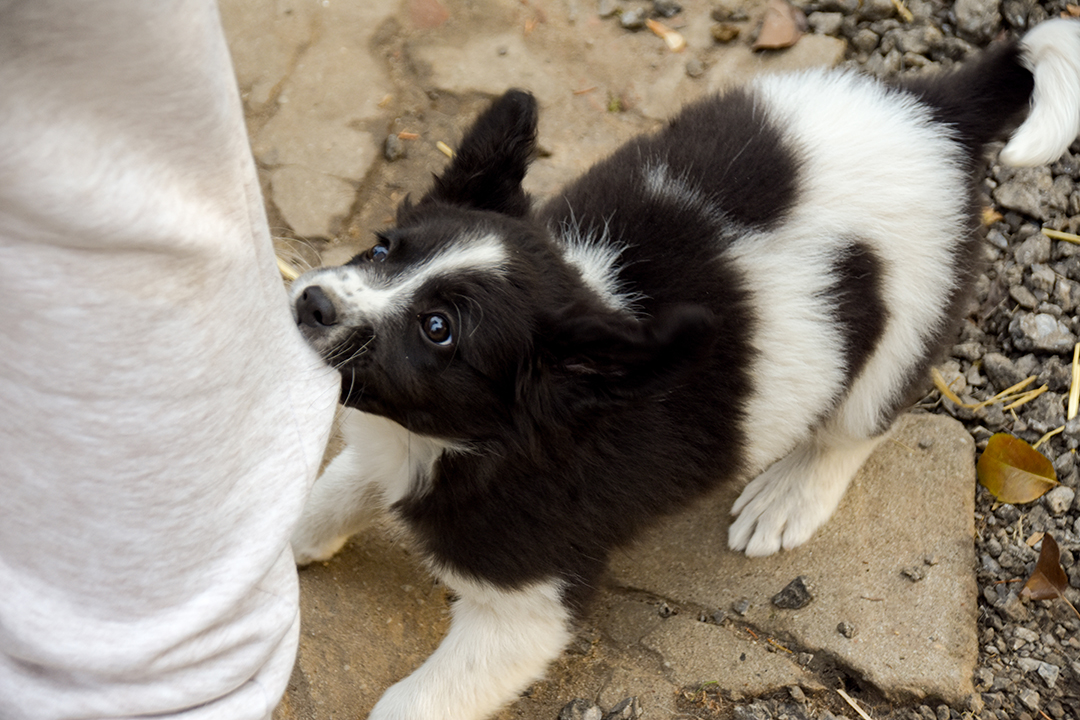
Training a border collie puppy not to bite can be difficult because biting is such a strong puppy behaviour. Biting is normal puppy behaviour but it is often painful, annoying, and difficult to manage. It often gets worse in the evenings when the family wants to relax in the lounge together and just watch TV. This tends to happen because your border collie puppy is:
- Tired
- Needing to play
- Bored
- Wanting attention
Why do puppies bite?
Puppies bite because it’s their way of exploring the world, and it’s what they would do with their littermates. Over hundreds of generations, they have evolved to learn how to resolve arguments with littermates, learn to run, stalk, chase and pounce, and learn how to communicate with other dogs using play, including biting, with their littermates. It’s not their fault that we are taking them from their littermates to live in strange households where suddenly they are being told off for doing what comes naturally.
Because puppies have such a strong, overwhelming desire to play with us, telling them off only confuses them. Some will respond fearfully to being told off, introducing fear into the dog-human relationship which can lead to many problems further down the line. Others will think it’s a huge game and respond with an increased intensity of play aggression, and this is what we see when we push the puppy away and it keeps coming back, biting harder.
This is why we want to calmly redirect the play biting onto toys.
Redirecting play biting

When the pup starts biting, redirect the biting onto the tuggy item, then find her something else to do. The tuggy items are not for puppies to play with on their own – they are not puppy-proofed – they are for playing WITH you, and you need to keep them with you or out of the dog’s reach. They need to be an extension of you, the same as your feet or hands, so that the dog wants to play with them. If they become a boring toy that they have lying around all the time, they will lose their value and your puppy will still want to chew your feet!
Once the puppy is play biting on the tuggy, find them an alternative behaviour that will calm them down, such as producing a filled kong, a treat-dispensing toy for puppies, a lickimat or a snuffle mat. Sniffing and licking calms puppies down, which is what you need to reduce overexcitement and bring down the levels of arousal. Carry out crate training (see our crate training advice), and put the pup in her crate with her activity and leave her for a few minutes to calm down.
Managing playful behaviour in the evenings
Training a border collie puppy not to bite is actually less about stopping the biting, and more about managing the puppy’s time so that she doesn’t get bored or tired and become motivated to start biting. Try and break the evening into compartments. The longer evenings will help with this now that it is starting to get light later on. So, for instance, you could have the following routine:
- Walk her for 20 minutes before you sit down for the evening
- Give her an ostrich bone, for example. (Large, relatively non-greasy, safe for puppies). When she starts to get fed up with that, put it away so that she’s interested in it when it comes out again later.
- Take her out into the garden for another toilet break.
- Do a bit of training – you could train the pup to lie down, sit or give a paw. Or you could do settle on a mat training.
- Take her out for another toilet break (having treats or bones is likely to make them want to go to the toilet).
- Give her a lickimat with soft cheese, soft dog food or doggy peanut butter spread on, in her crate. Licking helps to calm dogs as well as providing something for her to do. (Note: if using human peanut butter check the ingredients list for xylitol – very poisonous for dogs).
- Take her out for a toilet break again if needed!
- Play hide and seek – hide treats or a toy around the lounge and encourage her to find them. This will get her using her nose and sniffing tires out puppies as much as walking.

By continually providing her with activities, you will be ensuring that she doesn’t get bored, as well as tiring her out more, making it more likely that she will eventually settle and go to sleep.
You will also setting her up for success – by keeping her busy, she won’t be play biting, which means that she is behaving well and you can praise her, instead of always confusing her by telling her off and/or putting her in her crate. This will improve your relationship with your pup, in turn making the play biting less likely and setting you up in the best possible way for future training.
Finally, remember that this biting phase won’t go on forever. Most puppies start to calm down somewhere between 8 and 12 months. It’s always easier to manage in summer than in the dark winter evenings when puppies get bored so quickly! About 50% of collie puppies are wonderful, but about 50% are little terrors, so you’re not alone in feeling disappointed. If you can manage their behaviour well and get through the first 8-12 months, getting help from a collie specialist behaviourist if necessary, you will have a much calmer loving companion for life. They are wonderful dogs and well worth the bitey puppy stress!!

